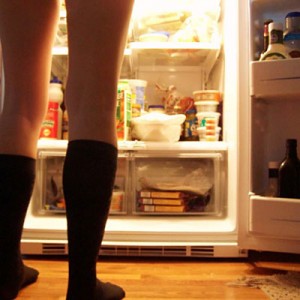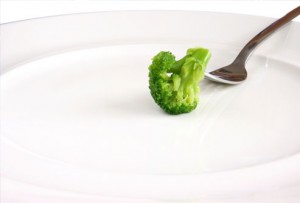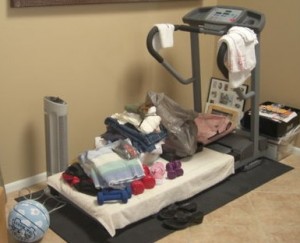 There are many little ways that people undermine their weight loss, without even realizing it. If you’re eating right and exercising, but still not seeing results on the scale, it could be due to a little accidental self-sabotage. Unfortunately, the reason behind your stalled weight loss could be anything from overestimating your calories burned at the gym to not getting enough sleep.
There are many little ways that people undermine their weight loss, without even realizing it. If you’re eating right and exercising, but still not seeing results on the scale, it could be due to a little accidental self-sabotage. Unfortunately, the reason behind your stalled weight loss could be anything from overestimating your calories burned at the gym to not getting enough sleep.
Find out if you’re stalling your weight loss with these common mistakes.
If you think you’re guilty of a little self-sabotage, find out how you can fix the problem with these tips.
Guesstimating Portions and Overeating
If you’ve lost a few pounds by tightening up on your diet, it can be easy to get a bit lax about portion sizes — and that’s the perfect opportunity for those extra calories to creep back in. Even if you’re eating healthier overall than you were pre-diet, too-large meals can easily push you off-track. A classic example is salad dressing. There’s nothing wrong with salad dressing, but if you’re not careful with how much you put on the salad, you’re undermining your diet. Go for low-fat, low-calorie salad dressings, and measure and track all portions for consistent weight loss.
Eating Too Few Calories
Many dieters make the mistake of thinking that if they cut more calories, they’ll lose weight faster. Experts warn that the opposite is almost always true. Trying to maintain a diet that is very low in calories leads to sabotage in the form of binging and, ultimately, giving up. Plus, cutting too many calories stalls your metabolism — possibly for the long-term. “In general, women shouldn’t eat less than 1,200 calories and men less than 1,500 calories a day.
Forbidding Foods and Binging
Tell yourself you can’t eat a certain food, and you may end up seeing it wherever you look. Making things forbidden can always cause trouble. But one recent Spanish study found that including some forbidden foods in a weight-loss diet can provide real benefits. In the study, researchers found that women who ate an occasional treat as part of their low calorie diet still lost weight and felt more full and satisfied after meals than women who cut out all carbs. and treats. letting yourself have a small amount of forbidden foods prevents high-calorie binging and keeps you happy with your diet plan and on track with weight loss.
Skipping Breakfast and Slowing Metabolism
A healthy breakfast isn’t just a tasty way to start the day, it can actually help you maintain your diet and weight-loss commitments. Study after study has confirmed that eating a breakfast that contains both protein and carbohydrates helps overweight people lose weight and normal-weight people maintain weight over time. So the next time you have a wild night out, resist the urge to skip breakfast the next day as a way to “make up” from the night before. Instead, consistently aim for balanced nutrition: wheat toast with peanut butter, or an egg, and a serving of fruit should do the trick.
Binging on Weekends
Your weekends may mean time off from work, but it’s not time off from your diet. After all, the weekend does make up more than a quarter of your month — and that’s way too much time to spend being lax about your eating habits. While we’re all for enjoying yourself on the weekends, if your habit is to indulge a little (or more) Friday evening through Sunday night every week, that’s diet sabotage. Stay on top of portion sizes Friday through Sunday while also taking advantage of additional time of the weekends to try new healthy recipes and squeeze in more calorie-burning activity.
Grazing and Eating More Calories
Many dieters are successful with frequent, small meals. But mini-meals aren’t quite the same thing as grazing throughout the day — a bite of pastry in the break room, a nibble of your co-worker’s candy bowl offerings, a handful of peanuts at happy hour, and a taste of cookie dough while baking can really throw your calorie count and nutrition out of balance. Go back to carefully measured snacks and meals for consistent weight loss.
Overeating After Workouts
The No. 1 commandment of weight loss is calories in vs. calories out, right? But if you’re allowing yourself to end each workout with a high-calorie treat, sports drink or a huge meal, you’re almost instantly eating away the calories you just burned. The “I deserve it mentality” may be the biggest culprit in this regard. Keep post-workout snacks small — a stick of low-fat cheese, fat-free milk, or half of meal bar that has both protein and carbohydrates, such as a CLIF Builder Protein Bar, will do the trick.
Sleeping Too Short or Too Long
Sleep might not feel like it adds much to your diet and exercise strategy, but studies show that proper sleeping habits are essential for maintaining a healthy weight. Although it’s not totally clear why a lack of sleep can cause weight gain, one recent study found that sleep-deprived people eat more — about 550 calories more — throughout the day than those who are well-rested. If you’re trying to sleep yourself slim, aim for seven to nine hours of quality ZZZs every night.
 Adding Extra Calories by Eating Late
Adding Extra Calories by Eating Late
Some people eat an extra meal late at night. This can happen when you stay up, get a bit antsy, and raid the pantry, or start to get the munchies while watching your favorite prime-time show. The resulting “snack” can be just as calorie-laden as your dinner was earlier in the night. And these calories count, just like all the others in your diet. Change it up by either going to bed before that urge kicks in (and get weight-loss-boosting sleep) or saving calories in your daily budget for a late-night snack that’s high on taste, but low in calories.
If night eating is a habitual problem for you, try to eat more during the day, so that you don’t find yourself starving at night. If you feel like you can’t control your night-eating, it may be time to seek professional help.
Caring Less About Weight Loss
If you care less about your weight loss now than when you started your diet plan, you might be willingly turning a blind eye to sneaky calories. Remember how hopeful and energetic you were those first days and weeks, with your charts, nutrition books, food logs, and athletic gear? Over time, that enthusiasm can turn to apathy and undermine your diet. Find your way back to weight-loss success by redefining your motivations and goals.
If you need an extra kick to get you going, set up nonfood rewards for yourself every time you reach a small milestone, such as a manicure if you make all of your scheduled workouts for two weeks running.
Exercising Less Effectively
It’s easy to get too busy to exercise. But if you consistently skip exercise or cut back on your workout to save time, you’re harming your weight-loss strategy. Get back on track by recommitting to the exercise plan that worked for you at the start of your diet. If you suspect boredom is causing the sabotage, you might need to rev up a stale workout by rotating in new moves, athletic goals, or group classes.
Miscalculating Workout Calories
Many people overestimate the calories they burn in a workout, leading to diet sabotage. This may be related to perceiving the effort as being greater than it actually is. Rather than count calories, think time and intensity. If you plan to walk, walk briskly for 30 to 45 minutes. Also, don’t underestimate your fitness abilities. Many women who use 2-pound dumbbells but routinely lift an 8-pound purse.
Ignoring Liquid Calories
Many people ignore the full calorie content of their drinks, commonly making costly diet mistakes like drinking too much alcohol or sugary drinks (sweet tea, coffee drinks, juices and alcohol). You can fill up on liquids but still need to eat, so you’ve consumed a lot more calories than you intended. Stick with water, unsweetened tea, sugar-free drinks, and fat-free milk (which also adds nutrition to your meals).














